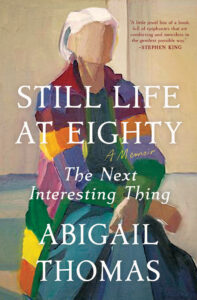I’ve always been curious about why one chooses fiction for one story and nonfiction for another. For me it’s pretty simple—some stories need to be served straight up. That’s nonfiction. Others need more architecture, that’s fiction. It’s a decision best left to the gut. It has been a long time since I wrote fiction, it felt like flying when it went well, but then so does everything; it was thrilling to go chasing some bright scrap of cloth, or a pregnant Dalmatian, or a wild goose, but sooner or later, once I’d had my fun, I’d have to put a roof over its head, give it a place to live and a reason for existing.
Article continues after advertisement
Nonfiction comes easily. When something catches my eye, or keeps cropping up, I write. I’ve been at this long enough to know that the next interesting thing often shows up in disguise, a bug, say, or a certain shade of blue, or a joke someone told that wasn’t funny. These bits and pieces don’t have to get dressed up for the occasion. I am distilling, not decorating. All I have to do is get it down and get it right. Get in and get out. It’s when I’m not quite hitting the bull’s-eye that I am flummoxed. There are any number of fragments I have brooded over for days, trying to find that elusive missing bit, needing to get rid of the unsatisfied feeling when I read it aloud to myself. I’m better at cutting. My friend Chuck used to call me the samurai editor.
I love the word “fragment.” It has a jagged quality. I looked it up in my copy of The American Heritage Dictionary of Indo-European Roots and found it’s a straight shot back to the beginning, because its ancestor, “bhreg,” meant “to break.” I’m not sure writing is our way of fixing what’s broken, although that’s often a by-product of writing. Sometimes the word “fragment” could be more accurately defined as “shrapnel,” and the trick is to determine where the pain originates, remove the foreign object with surgical precision, and see what it is. Painful, but it’s part of the deal.
What am I up to? I’m an old woman picking up the pieces of her day, wondering where they might lead, loving the journey.
I never know if what I’m writing will add up to anything but I’m always curious to see where my mind goes when it’s off-leash. What does it stop to inspect, what does it return to? What the hell am I doing? What are all these memories doing in here? Then there’s a physical rush, like falling in love, when what I’m doing begins to reveal itself. I had my eightieth birthday in 2021. What am I up to? I’m an old woman picking up the pieces of her day, wondering where they might lead, loving the journey.
*
I longed to be a writer. How did anybody do it? Who was I? I thought a real writer had something to say, something important, and serious; I didn’t know anything that mattered. Worse, I couldn’t make a story come together in my head. Where to start? How to finish? My problem was I was trying too hard and giving up too quickly. My problem was I thought you had to know what you were doing. Nonsense. You just have to start.
I give assignments in my writing classes because it’s hard to make something up out of a clear blue sky. Two pages is all I ask, and it doesn’t have to be a story. It doesn’t have to be an anything. It can contain a character who shows up out of breath. It can contain a lake and a bunch of swans. There can be conversation or silence. It can take place entirely in the dark. I have learned we do better when we’re not trying so hard—there is nothing more deadening to creativity than the grim determination to write a story. At the very least, assignments can provide a writer with a nicely stocked larder, and some notion of where the mind goes when it’s off its leash. And once in a while, if we’re lucky, an assignment helps you find the side door into a story you’ve been staring too directly in the eye.
Write two pages that begin with the sentence: “This is a lie I’ve told before.”
Good luck.
__________________________________

Excerpted from Still Life at Eighty: The Next Interesting Thing by Abigail Thomas. Copyright © 2023 by Abigail Thomas. Reprinted by permission of Scribner, an imprint of Simon & Schuster, LLC.
